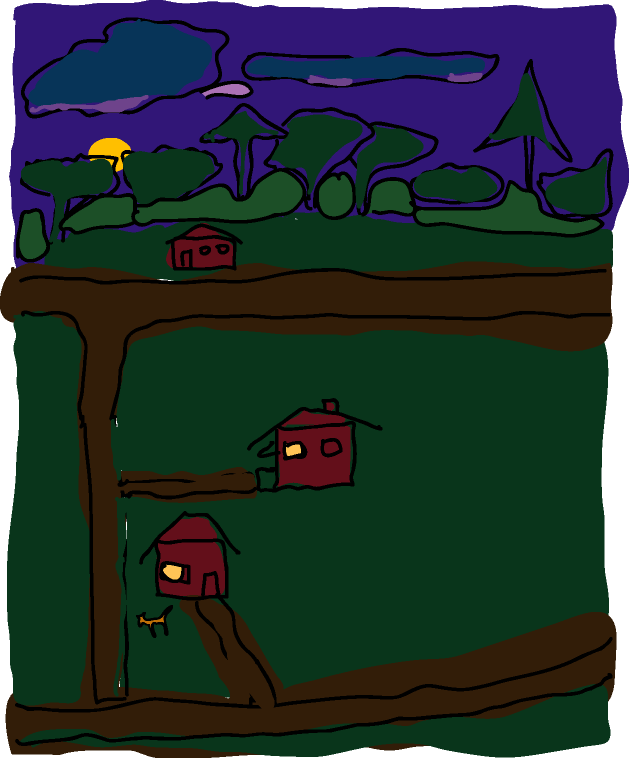|
Hi Jim!
Try to see two things at once: you have a mind; you have outer
reality. It's free; it's in prison. It's clean; it's dirty.
We live in a very repressive, bizarre society; we are all happy,
sparky individuals with free will.
Try to understand the kids in the neighborhood DO like you! What
would they do without the weird, strange, old Tai Chi monster? You
have to get back to basics, especially with children. Their parents
are trying to trick you, and their own children, into thinking they're
important! And the tricks are so clever, they work! Well, no wonder.
People have brains, and people can use every ounce of their brain
power into tricking people into thinking some people are important
(not important), good (not good), special (not special), right (not
right), a member of the country club set (not a member of the country
club set), or a golf swinger (not a golf swinger).
Brain power is one thing; real intelligence is another.
The shortcut is to see you're alive (not alive), and you really
feel things like fear, hurt, anger or hatred, (and most important,
the way you are breathing!) and you won't feel all those delicious
life-affirming sensations after you're dead! It's pain, all right.
It's good to sense intense emotional pain completely, because then
you get through it. Hurt feelings ... Where do they come from? They're
being generated by some part of you. Does your hand feel hurt? Does
your elbow? At first, try to see emotional pain as the over-excitation
of pleasure.
So someone in my taxicab says, "Is that all there is, is fear,
hurt, anger and hatred? What about love?"
Real possibilities come from the real feelings, which are faith,
hope, love, charity, kindness, and compassion, and you can't begin
to live from those subtle feelings without fully acknowledging (and
releasing in intelligent ways) the crap bottled up inside the pressure
cooker (which we create to get along in civilization!)
Okay, so let's get to the bottom of all this, into the essence
of mysticism. You have something inside you. It was buried at a
very young age. It understands you, you don't understand it. It
understands your breathing, you forget about your breathing. It
understands the language of sensation, you ignore the language of
sensation in favor of "emotional interpretations" of adrenaline,
and other biological reagents. It tries to communicate to you through
the dreams you have at night, though it has been shuttled into the
part of your mind that is "preverbal," without much support
from you or anyone else. As a matter of fact, your parents hated
this part of you because it was not socially acceptable! It spoke
the truth. It could shit in the middle of the floor! It could pee
on the side of a tree! It saw things as they really are.
When you dream at night, you are seeing its mind from the inside.
When you are awake during the day, you don't like what it looks
like from the outside, from the point of view of your "imagined
self," and you banish it from your awareness. You think it's
a mean, little rat! It looks like a rat to you! It isn't a rat!
It's you! It's your tiny little Id that you keep chasing into a
closet. You'll take care of it! You'll wear earphones!
The real part of you speaks in symbols and understands symbols,
so here's a wonderful symbol for it: Think of yourself as a pyramid,
with four sides. Those four sides are fear, hurt, anger and hatred.
You have brick walls out there. Now, underneath the pyramid, in
a treasure vault inside, are the real emotions, faith, hope, love,
charity, kindness, and compassion. (Faith is really paying attention).
Above, each pyramid is like an island in the sea. Beneath, all connected
by electricity!
You're absolutely on the right track asking your class to ask essential
questions! This is the real way.
Notice two kinds of people in the class: One kind of person is
holding onto themselves. Another kind of person is holding onto
their mother. When people are holding onto themselves, they'll listen
and understand anything. When people are holding onto their mother,
they'll just say or do anything their mother would say or do. It's
automatic; it's the robot.
Some of them have what's called a "bad act" and don't
even know it's a bad act! They're very strict, very stubborn, (anger
tied in a knot = stubborn), and they may think they'll be happy
by acting like their mother. It's like getting a palm tree to grow
on the North Pole!
In your classes, try to see yourself as a director at a Shakespearean
theatrical production. Sometimes the "actors" (students)
will be talking to you from themselves, sometimes they'll be catching
an inkling of their "acts," some may catch an idea of
the possibility of trying conscious new roles, (with optional scripts,)
and a few may even understand something about growing a palm tree
(understanding).
On a moment-by-moment basis, they'll be asking two kinds of questions:
One kind of question has to do with being themselves, with their
lives and experiences, with their individuality, with their hopes,
dreams and fears. Here, you simply speak from your own life ...
from your personal experiences ... from insight, intuition and spontaneity.
The other kind of question has to do with the forms of the Shakespearean
production, the forms of Tai Chi, the forms of Non-escalating Verbal
Self Defence, the forms of block, thrust and parry. These are all
very specific, precise, and the opposite of ad-libbing.
You can't possibly be expected to know the answers to all their
questions about the "scripts!" They're on the website,
you know? Who knows what they mean?
For you to be able to answer a question about the use of a script
such as "Who knows?" in a non-scripted situation is a
little over the top of the pyramid, don't you think?
Ciao,
-Richard.
|


